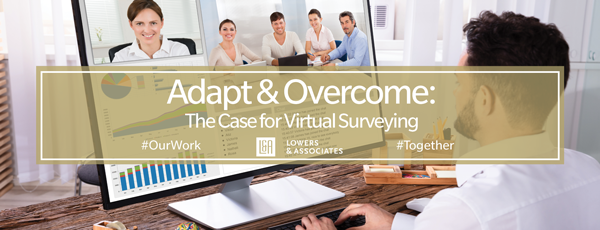Adapt & Overcome: The Case for Virtual Surveying

As discussed in our most recent LinkedIn post, COVID 19 has forced companies to review and amend their operations top to bottom. And whether these changes are temporary or long-term, one thing is certain: the impact on both business and employee culture is permanent.
The best businesses right now are doing two things: 1) finding ways to stay open and 2) evaluating the future. And the best leaders of these businesses understand the value of employee training, especially in times like these: a safe, secure environment creates well-being for employees and customers, which enables more innovation with less interference. Given the current circumstances, employees want to be sure that their employer is looking out for them. The first step in achieving this (while also keeping the cash registers ringing so that your strategic plan has a future) begins with a wholistic understanding of the business risks. That is, surveying.
While traditional consulting and surveying is simply not plausible right now, recent advancements in technology and encrypted video have made virtual surveying a viable option. For businesses considering a virtual survey, the team at Lowers & Associates has compiled a list of insights and considerations that may be helpful in your discovery process:
- The primary benefit of virtual surveying is that it can be conducted anytime, anywhere. With no travel, virtual surveying is one of the best ways forward-thinking businesses can control costs.
- Virtual surveys are less disruptive to the organization and provide quicker report-in-hand turn around. This can be a massive advantage for organizations pressed for time or with reduced staff capacity.
- Always a collaborative exercise and NEVER the “lesser of two evils,” virtual surveys can often provide deeper insights than those conducted in-person (sometimes business owners feel more at ease with a physical distance between themselves and the surveyor).
- Rapid advances in technology come with a learning curve. Leading risk mitigation consultants should be versed in a suite of technology applications to successfully execute a virtual survey.
- Information is information, right? Sort of. Asking the right questions matters, knowing how to analyze the answers makes all the difference, and consistency is king. Virtual or not, surveyors reviewing requested documentation and/or an audio/visual recording of the survey should be able to turn around the same exact results.
- Consistency is key in both business and surveying. Virtual surveyors should be able to hand over responsibilities to another surveyor if one should fall ill or become unavailable. Process can be both a businesses’ arrow and its Achilles Heel!
- Virtual surveying should include an ability to perform the following:
- Pre- survey meetings
- Staff competency and interviews
- Reviews of:
- Day to day operations
- Site physical security
- Insurance
- Fiduciary Controls
- Policy & Procedure
- Vault construction
- Crime and illegal activity (Local and Countrywide)
- Facility Design Consultation
- Follow up consultation meetings
Adaptation is crucial for businesses during this real-time reinvention of the workplace, and for 30 years, Lowers & Associates has pushed the boundaries of technology to keep those workplaces safe (this includes virtual surveying). #OurWork #Together has also always been collaborative, and so we encourage you to view and share the insights, stories and applicable tips that our team has been publishing at the Lowers & Associates LinkedIn page. If you have any questions, please contact us.